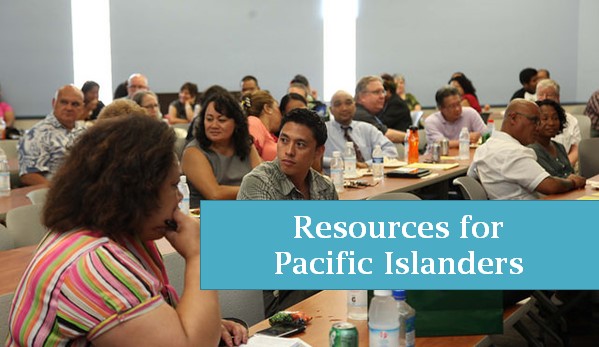
The White House Initiative on Asian Americans and Pacific Islanders, housed within the Department of Education, created a Pacific Island Task Force to engage agency officials on issues that impact Pacific Island communities, such as affordable housing and homelessness, veterans’ health care, economic investment and workforce development, and access to federal programs and resources. Launched in September 2014 in collaboration with the U.S. Department of the Interior (DOI), the Task Force set out to develop capacity building and technical assistance support programs, coordinate best practices, and tailor agency activities to respond to the needs of Pacific Island populations in the United States and its territories. Over the past year, the Task Force also advocated for data disaggregation to include the Pacific Islands to better measure and increase opportunity and access to federal programs. A full progress report with agency accomplishments will be released in February 2016. Highlights include the following:

New Portal Provides Grant Resources and Training: On January 19, 2015, the Initiative hosted a grant writing training 101 in Mangilao, Guam, for Pacific Islander community leaders. All resources and information shared during the training is additionally stored on a new Resources for Pacific Islanders webpage. This easy-to-navigate portal displays grant writing training manuals and tools and information on federal grants and loan programs available to Hawaii and the Pacific Islands, and links to key federal offices and training opportunities for Pacific Islanders.
DOI Opens One-Stop Centers in Hawaii and Guam: Esther Kia’aina, Assistant Secretary for Insular Affairs at DOI, provided grant assistance to develop “One Stop Service Centers” for Micronesian and Pacific Islander communities in Hawaii and Guam to support the financial and social welfare of migrants from the Federated States of Micronesia, the Republic of the Marshall Islands, and the Republic of Palau. In Honolulu, We Are Oceania opened the One Stop Welcome Center for Micronesians on August 28, 2015, which connects Micronesians to local programs and services including health, language acquisition, employment, housing, and education. In Guam, Big Brothers Big Sisters of Guam plans to create a Micronesian Resource Center One-Stop Shop Project, which is anticipated to open November 2015.
Veterans Affairs Announces Improved Health Care on Guam: On July 20, 2015, the U.S. Department of Veterans Affairs (VA) launched its Pacific Islands Health Care System’s Rural Health Extension Care program. This four-person rural health extension team, consisting of a medical support assistant, registered nurse, clinical psychiatrist, and medical doctor, expands access to behavioral health and medical services for Guam veterans beyond the VA’s community-based outpatient clinic, and offers services at both the Guam Department of Public Health and Social Services’ north and south health facilities. The VA also plans to expand the Agana Heights outpatient clinic by 2,800 square feet, including a second floor, with construction beginning next year.
Treasury Launches Small Business Credit Initiative: On August 1, 2014, the U.S. Department of the Treasury launched the U.S. Treasury State Small Business Credit Initiative. The new program modifies the ASG State Small Business Initiative Program, and could potentially create 50,000 new businesses and 400,000 new well-paying, non-exportable medical, health, and health-related jobs. The ultimate goal of the program is to expand healthcare to all American Samoans; improve the American Samoa economy; and increase equity, ownership interest, and private health insurance for the region.
Department of Education Connects Pacific Postsecondary Institutions to Federal Education-Related Resources: The Office of Career and Technical Education/Community Colleges in the Department of Education convened the Pacific Postsecondary Education Council in June 2015 in order to connect these community colleges and universities to federal resources such as grant programs and technical assistance. The Federal Student Aid School Customer Experience division spoke on reducing student loan default rates. The USDA SNAP Education and Training department presented how to utilize SNAP benefits. The National Science Foundation discussed the programs available to PPEC institutions and the Federal Interagency Undergraduate STEM Task Force. The Department of Education also invited the group to participate in its meeting in Washington, DC in November 2015 on increasing student success in minority-serving community colleges.
Health and Human Services Improves Grant Report Data: The U.S. Department of Health and Human Services Region 9 Federal Regional Council, Outer Pacific Committee overhauled its annual Grants to the Outer Pacific Funding Report to better track federal grants and loan opportunities available to the Pacific Territories and U.S.-Associated States. The FY 2015 report will expand federal agency data in the report and clarify program eligibility.
Looking forward to 2016, the Pacific Island Task Force will develop and release a Best Practices for Technical Assistance and Support for Pacific Islanders guide for federal agencies, provide a comprehensive accomplishments report, and include the Pacific region in 2016-2017 agency plans to ensure greater transparency and accountability to Asian American and Pacific Islander communities.
Mary Okada is Vice Chair of the President’s Advisory Commission on Asian Americans and Pacific Islanders. The Commission and the White House Initiative on Asian Americans and Pacific Islanders, housed under the U.S. Department of Education, work to improve the quality of life for AAPIs.

